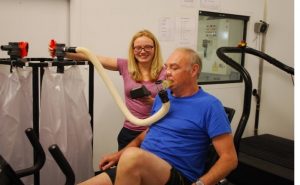Dr Neil Maxwell and Kirsty Waldock (PhD student), presented at Public Health England’s Annual Heatwave Seminar on March 14 2017 that reviewed the Heatwave Plan in an attempt to reduce the number of deaths, reduce illness and hospital visits and increase public awareness. The seminar hosted delegates and speakers from PHE, NHS, Met Office, national climate change committees and charities, as well as regional council public health departments and universities from around the country. International representation also came from the US National Oceanic and Atmospheric Administration.
Background
In Europe, 71,000 people died during the 2003 heat wave, with over 2000 of these excess deaths in England and Wales. For every 1°C above 23.3°C, an extra 75 deaths per week are estimated in the UK [Public Health England (PHE), 2015]. Last year was the third consecutive warmest year since records began and as the earth’s climate is warming with the frequency, intensity and duration of heatwaves increasing, this presents a significant health risk to vulnerable populations (e.g. elderly, children, chronically ill and those with heat sensitivity).
Heat sensitive populations
Neil’s presentation was alerting the audience to a variety of heat-sensitive populations that should be acknowledged in the heatwave plan, the value that an index of heat illness susceptibility, the merits of a wider range of heat-alleviating methods that could be used and the importance of exercise, even during hot weather. With PHE estimating physical inactivity to cost the NHS in England more than £450m a year, discouraging people to exercise as soon as the weather turns hot is not the right message.
Exercise, heat and the elderly population
Kirsty’s presentation continued this theme, by presenting data she had recently collected that will lead to the development of an elderly-specific guide for assessing heat illness risk in the UK during exercise-heat stress. A novel finding from Kirsty’s research is that there is a mismatch between how hot the elderly get during exercise and how hot they think they are. Therefore, the elderly may be perceptually less aware of the dangers of hot weather and increase their risk of experiencing a heat-related illness. The key message to both Neil and Kirsty’s presentations was to ensure that safe exercise is carried out during periods of hot weather and more research needs to examine practical heat-alleviating approaches that can be used by more vulnerable populations.
Contribution to Heatwave Plan
PhD student and university studentship recipient, Kirsty Waldock, is supervised by Dr Neil Maxwell, Associate Prof Peter Watt and Dr Mark Hayes from SESAME, while investigating ‘heat waves in the elderly and the impact of acute and chronic heat-alleviating strategies on health’. Neil said “Kirsty really stepped up and delivered an excellent presentation that received considerable interest and questions afterwards”. The chair of the seminar, Dr Angie Bone, Head of Extreme Events and Health Protection, Public Health England, noted in her summation both Neil and Kirsty’s “important contribution to this year’s seminar, where the importance of exercise and the many methods to heat-alleviate were critical to reflect in future plans”.
